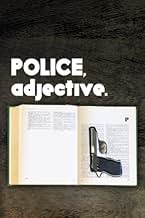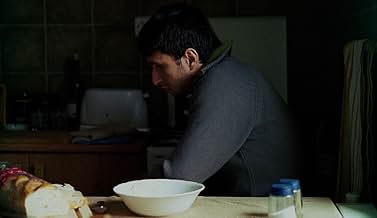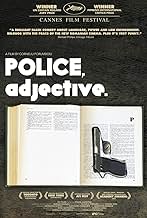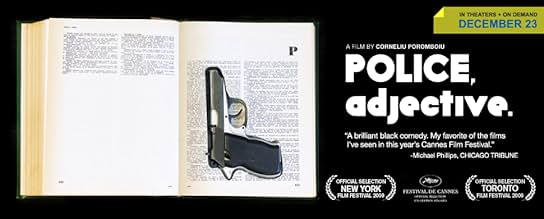IMDb RATING
6.9/10
5.4K
YOUR RATING
A police officer refuses to arrest a young man for offering drugs to his friends.A police officer refuses to arrest a young man for offering drugs to his friends.A police officer refuses to arrest a young man for offering drugs to his friends.
- Awards
- 15 wins & 15 nominations total
George Remes
- Vali
- (as Remes George)
Constantin Dita
- Officer on Duty
- (as Costi Dita)
- Director
- Writer
- All cast & crew
- Production, box office & more at IMDbPro
Storyline
Did you know
- TriviaRomania's official submission to 82nd Academy Award's Foreign Language in 2010.
- SoundtracksNu te parasesc iubire
Performed by Mirabela Dauer
Arranged by Dan Dimitriu
Lyrics by Dan Ioan Pantoiu
Produced by Roton Music
Played and discussed at Cristi's home
Featured review
Like Bruno Dumont's epic police procedural L'Humanité, Police, Adjective is a film of mood, silence, and soul. Winner of the Un Certain Regard Jury Prize at the 2009 Cannes Film Festival, the second feature by Romanian director Corneliu Porumboiu is a follow-up to his black comedy 12:08 East of Bucharest which won the Camera D'Or at Cannes in 2006. Police, Adjective is about a taciturn, plain-clothed police officer who has developed a conscience over making an arrest, an unusual occurrence in the bureaucratic, post-Communist society of Romania where the law is rigidly enforced regardless of its logic. Like Phaaron of L'Humanité, Cristi (Dragos Bucur) is an unlikely cop, an unglamorous member of the working class who wears the same pullover sweater four days in a row and goes about his job in a mechanical and emotionally unexpressive manner.
Shown at the Vancouver Film Festival, Police, Adjective is set in the director's hometown of Vaslui in northeastern Romania, a venue that looks unbearably bleak. The general atmosphere is one of decay with paint inside the houses peeling and chipped, lockers rusted, mailboxes broken, and computers looking like Model Ts. There are no camera tricks here, only long takes delivered from a horizontal pan, cinematography that deliberately enhances the tedium. Porumboiu devotes long stretches of the film watching Cristi simply going about his routine. On orders from his superior, Nelu (Ion Stoica), he follows Alex (Alexandru Sabadac), a teenager at the local high school who is suspected of buying hash and selling it to his fellow students, shadowing the boy daily from home to school in hopes of finding out the source of the drugs.
In the course of his investigation, however, Cristi realizes that Alex is just a kid who occasionally smokes pot with some of his pals and is not a threat to society. Taking detailed notes, Cristi avoids meeting with his boss, waiting to find out the source of the hash before making a move, knowing that arresting a sixteen year old boy for smoking will mean a prison term of at least three years and possibly seven. Finally, when he is ordered to make a full report and take action, Cristi refuses to follow orders from the Police Captain, citing his conscience and the fact that the law will soon be repealed. Like Phaaron of L'Humanité, Cristi is willing to remain faithful to what he believes in but his feelings are ignored by those in a position of power.
In a memorable sequence, Cristi's boss, Captain Anghelache (Vlad Ivanov) brings in a Romanian dictionary and asks him to look up the meaning of the words "conscience", "law", "moral", and "police", attempting to show him that as a police officer he must obey the letter of the law, not impose his own morality on the situation. The scene is cold, efficient, and persuasive but it is obvious that the law he is asked to follow is based more on semantics than on morality. While most of the first half of the film is filled with uneventful surveillance, a scene at home between Cristi and his wife Anca (Irina Saulescu) adds some humor to the dour proceedings. Husband and wife discuss the meaning of the lyrics of a popular song that Anca is playing over and over again, Cristi giving the words a literal meaning which make little sense, while his wife ascribes to them their proper symbolic and poetic meaning.
Police, Adjective provides a welcome dose of conscience to a genre that has been buried in technology and filled with violence, car chases, and ugliness, a genre that has dealt only with methods and not consequences. While the film is austere and requires a great deal of patience, with little dialogue and no musical score, Porumboiu forces us to relate to the characters by observing their eyes, their physical movements, and their facial expressions. He expects us not only to see but to think about what we are seeing and, in the process, to bring us face to face with what makes us truly human.
Shown at the Vancouver Film Festival, Police, Adjective is set in the director's hometown of Vaslui in northeastern Romania, a venue that looks unbearably bleak. The general atmosphere is one of decay with paint inside the houses peeling and chipped, lockers rusted, mailboxes broken, and computers looking like Model Ts. There are no camera tricks here, only long takes delivered from a horizontal pan, cinematography that deliberately enhances the tedium. Porumboiu devotes long stretches of the film watching Cristi simply going about his routine. On orders from his superior, Nelu (Ion Stoica), he follows Alex (Alexandru Sabadac), a teenager at the local high school who is suspected of buying hash and selling it to his fellow students, shadowing the boy daily from home to school in hopes of finding out the source of the drugs.
In the course of his investigation, however, Cristi realizes that Alex is just a kid who occasionally smokes pot with some of his pals and is not a threat to society. Taking detailed notes, Cristi avoids meeting with his boss, waiting to find out the source of the hash before making a move, knowing that arresting a sixteen year old boy for smoking will mean a prison term of at least three years and possibly seven. Finally, when he is ordered to make a full report and take action, Cristi refuses to follow orders from the Police Captain, citing his conscience and the fact that the law will soon be repealed. Like Phaaron of L'Humanité, Cristi is willing to remain faithful to what he believes in but his feelings are ignored by those in a position of power.
In a memorable sequence, Cristi's boss, Captain Anghelache (Vlad Ivanov) brings in a Romanian dictionary and asks him to look up the meaning of the words "conscience", "law", "moral", and "police", attempting to show him that as a police officer he must obey the letter of the law, not impose his own morality on the situation. The scene is cold, efficient, and persuasive but it is obvious that the law he is asked to follow is based more on semantics than on morality. While most of the first half of the film is filled with uneventful surveillance, a scene at home between Cristi and his wife Anca (Irina Saulescu) adds some humor to the dour proceedings. Husband and wife discuss the meaning of the lyrics of a popular song that Anca is playing over and over again, Cristi giving the words a literal meaning which make little sense, while his wife ascribes to them their proper symbolic and poetic meaning.
Police, Adjective provides a welcome dose of conscience to a genre that has been buried in technology and filled with violence, car chases, and ugliness, a genre that has dealt only with methods and not consequences. While the film is austere and requires a great deal of patience, with little dialogue and no musical score, Porumboiu forces us to relate to the characters by observing their eyes, their physical movements, and their facial expressions. He expects us not only to see but to think about what we are seeing and, in the process, to bring us face to face with what makes us truly human.
- howard.schumann
- Oct 18, 2009
- Permalink
- How long is Police, Adjective?Powered by Alexa
Details
- Release date
- Country of origin
- Official site
- Language
- Also known as
- Policía, adjetivo
- Filming locations
- Production companies
- See more company credits at IMDbPro
Box office
- Budget
- €800,000 (estimated)
- Gross US & Canada
- $53,206
- Opening weekend US & Canada
- $19,452
- Dec 27, 2009
- Gross worldwide
- $162,974
- Runtime1 hour 53 minutes
- Color
- Sound mix
- Aspect ratio
- 1.85 : 1
Contribute to this page
Suggest an edit or add missing content




























